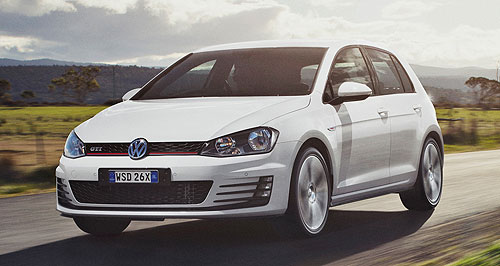Make / Model Search
News - General News - RegulationVictoria to wind back on turbo, V8 blanket banFast money: Volkswagen’s Golf GTI is not classed as a high-performance vehicle under a new benchmark being set by the Victorian government to open up more fuel-efficient and modern cars to P-plate drivers. Revised laws open up buying choices for newly licensed Victorian drivers17 Jun 2014 By BARRY PARK PERFORMANCE-honed cars such as the turbocharged Volkswagen Golf GTI, Hyundai's Hyundai i30 SR turbo and even a $114,490 298kW V8-engined Nissan Patrol will be available to Victorian P-plate drivers from July. The Victorian Government announced this week that it will fall in line with recent changes to nationalised licensing laws and allow new drivers to slip behind the wheel of a number of previously prohibited models – including low-end performance cars and V8-engined off-roaders. However, the relaxing of the bans, which excluded newly licensed drivers from driving almost all vehicles with turbocharged, performance six-cylinder and V8 engines, also means they will not be barred from buying and driving a new range of fuel-efficient vehicles. Car-makers such as Audi, BMW, Mercedes-Benz, Fiat, Ford and Volkswagen are rolling out new generations of fuel-efficient petrol and diesel vehicles that rely on turbocharged two-, three- and four-cylinder engines that are much smaller than non turbo- or supercharged engines. Some car-makers are even working on a new generation of electrically driven turbochargers that will help them eke out even more fuel savings, suggesting even more vehicles will join the roads using the technology. However, Victorian laws affecting all new licence holders and introduced in 2011 cast a blanket ban on turbo and V8 engines unless the drivers applied for an exemption, or proved they needed to drive a turbocharged or V8 vehicle as part of their work. Under the new legislation, P-platers will be banned from driving vehicles with a power-to-weight ratio of more than 130kW/tonne – a benchmark loosely used before the blanket ban was introduced. “These are practical changes that recognise that some smaller cars have turbo as standard now, for example, while making sure P-platers don't drive cars that big and built for speed,” Victorian roads minister Terry Mulder said in a statement announcing the change. “It will not matter how many cylinders the vehicle has, what fuel type the vehicle uses, or whether the vehicle is turbo or supercharged. “What matters is the engine size relative to the size of the car. “This is great news for P-platers that are looking to buy their first car, who will now have a greater range of cars to choose from including those that may be more fuel-efficient,” he said. Mr Mulder said V8-engined off-roaders were added to the list in recognition that P-platers who live in regional areas – where such vehicles are common – would have access to more job opportunities. Volkswagen Australia general manager of communications Karl Gehling said Victoria was falling in line with other states – South Australia, Queensland and potentially New South Wales – as the 130kW per tonne benchmark was adopted nationally as a standard system of classifying high-performance vehicles. He said the change in Victoria would have little effect on sales for the brand. “For us, it’s finally recognising that turbocharging has moved on since the 1980s and that it is not all about power performance, and that it‘s something more about delivering efficiency. “I don’t think it will have a big impact on sales because most states offered an ability to get an exemption base don the fact that they understood that certain vehicles weren’t truly performance vehicles just by the default of having a turbocharger. “That was recognised initially when the rules were put in place and they excluded diesels,” he said. Mr Gehling said the fact that the legislation, due to be introduced on July 1, would rate both the Polo GTI and strong-selling Golf GTI as anything other than performance cars was not an issue for the brand. “It (the legislation) excludes them on a power-to-weight ratio, it doesn’t change the vehicles in any way,” he said. “I think their definition is high-performance vehicles, and based on their criteria, they don’t come under that criteria. “Obviously the other factor that plays into this is the assumption that it’s all about kilowatts, which has always been part of the argument when they excluded diesels in the initial rules, which saw some high-kilowatt and torque output diesel engines excluded from the exemptions.” He said the change to the laws would also remove a layer of inconvenience for consumers, who were sometimes confused by the restrictions.  Read more |
Click to shareGeneral News articlesResearch General News Motor industry news |










Facebook Twitter Instagram